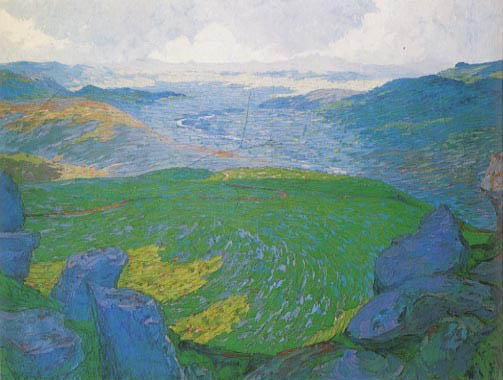
|
|
Bertha
Everard
Always restless
and fiercely independent, the spirited Bertha was determined to
raise her children according to her own non-conformist principles
and insisted that they would not attend formal schooling. Their
education would often include accompanying their mother on lengthy
(sometimes weeks long) painting excursions into unexplored terrain
by ox wagon. They would later be joined on these artistic "safari"
adventures by their beloved aunt Edith who had become by then the
headmistress of Eunice School in Bloemfontein
Bertha's
powerful works painted on these trips capture the solitude and mystery
of the African veld, accentuating the overwhelming enormity of the
environment. They are brooding, poignant landscapes usually captured
at dusk as the strong African light sinks and fades, casting its glow
on the still warm, golden, dry hills and veld. Some show dusty ribbons
of road or slow, snaking rivers leading the viewer, as though a traveller,
through remote hills and gloomy valleys into the twilight.
|
|
Bertha Everard was born in Durban, South Africa 1873 - 1965
Art Education
- 1888 – 1890 Bertha Everard trained as a concert-pianist in Vienna, where she first started painting seriously.
- 1891 Bertha Everard studied art under Sir Hubert Herkomer at Bushey.
- 1893 Bertha Everard studied art at Slade and Westminister Schools, London, under Mouat; St Ives School of Landscape, Cornwall.
- 1925 – 1926 Studied art informally in Paris.
Short Artist Biography
- Educated in England;
- 1891 – 1901 Bertha Everard showed a talent for portraiture while studying in London, but concentrated on landscape painting from the time she worked in Cornwall; taught art at Walthamstow Hall, Sevenoaks, Kent; several works hung on the line at Royal Academies - Wild Parsley bought for Wednesbury Permanent Gallery (since resold).
- 1902 Bertha Everard returned to South Africa with Milner Teachers following the Anglo-Boer War; taught at Pretoria High School for Girls.
- 1903 Married CJ Everard, with whom she subsequently settled on the farm ‘Bonnefoi’, in the Carolina district of the Eastern Transvaal.
- 1910 The ‘Star’, 25 March 1910, hails “the discovery of a new South African painter” when Bertha Everard won the Gold Medal for an oil landscape, Mid-Winter on the Komati River (Peace of Winter), at the South African National Union art exhibition organized in Johannesburg by Florence Phillips.
- 1917 Elected a member of South African Society of Artists.
- 1922 – 1926 Bertha Everard took her family to Europe to study; lived in England and in Paris, during which time she painted actively, exhibited on the Paris Salon and was influenced by post-Impressionist styles.
- 1926 Bertha Everard returned to South Africa and a life of painting on the farm; painted exclusively in oils. Four of her paintings, Peace of Winter in the Johannesburg Art Gallery; Moonrise, Transvaal; On The Banks of the Komati; and Delville Wood, in the Pretoria Art Museum, were reproduced by the Medici Society. Peace of Winter was subsequently republished by E Schweikerdt, Pretoria.
Art Exhibitions
- Bertha Everard exhibited on the Royal Academy prior to 1902 and again in 1911 and 1923;
- 1910 SANU Exhibition of Arts and Grafts, Wanderers’ Club, Johannesburg. Exhibited on annual exhibitions of South Africa Provincial Art Societies.
- 1916 First one-man exhibition, Bloemfontein.
- 1924 South African Section, British Empire Exhibition, Wembley; Paris Salon.
- 1926 Paris Salon.
- 1936 Empire Exhibition, Johannesburg;
- 1952 Van Riebeeck Tercent Exhibition, Cape Town. Various exhibitions of the Everard Group during her life-time.
- 1967 Prestige Retrospective exhibition – ‘The Everard Group’, Pretoria Art Museum.
Public Art collections
-South African National Art Gallery, Cape Town; Johannesburg Art Gallery; Pretoria Art Museum; Durban Art Gallery; Tatham Art Gallery, Pietermaritzburg; Libertas; William Humphreys Art Gallery, Kimberley; National Museum, Bloemfontein; Libertas, Pretoria; Rand Mines, Johannesburg; South African House, London.
Source
Berman, E. 1994. Art & Artists of South Africa . Southern Book Publishers.
|
|
 |







